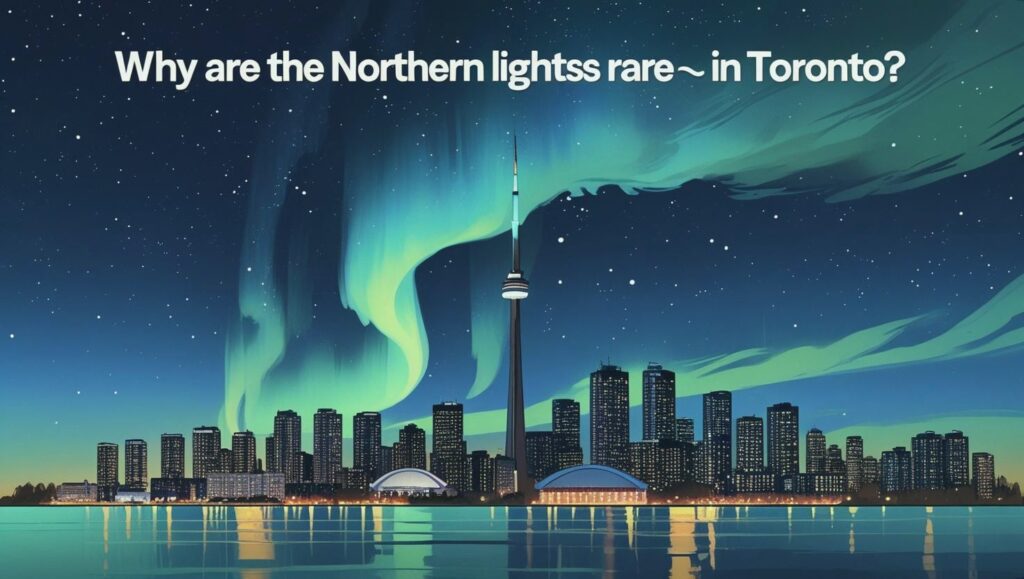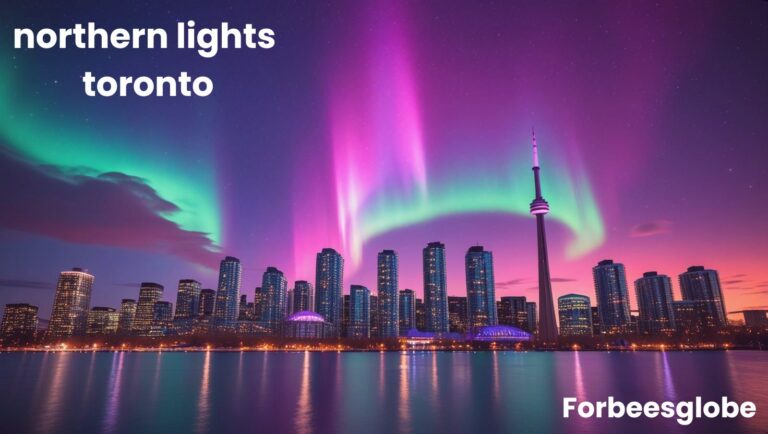Seeing the northern lights Toronto is a rare but unforgettable experience—and yes, I’ve seen them once just outside the city, and it was pure magic. In this ultimate guide, you’ll learn exactly when and where to watch the northern lights in Toronto, how to track real-time aurora forecasts, and which dark-sky spots near the city offer the best views.
Whether you’re a casual night-sky watcher or chasing your first aurora photo, this article gives you expert tips to make it happen.
With rising solar activity in 2025, your chances of seeing the northern lights in Toronto are better than ever. Don’t miss out on one of nature’s most breathtaking shows—right in southern Ontario!
What Are the Northern Lights?
The northern lights, or aurora borealis, are natural light displays caused when charged particles from the sun—mainly electrons and protons—collide with Earth’s magnetic field and upper atmosphere. These collisions release energy in the form of glowing light.
Depending on the type of gas and altitude of the collision, the lights can appear:
- Green (most common, from oxygen at lower altitudes)
- Pink or red (oxygen at higher altitudes)
- Blue or purple (from nitrogen)
The result? A surreal, shimmering curtain of light dancing across the night sky—a sight that’s both mystical and scientific.
Why Are the Northern Lights Rare in Toronto?

Toronto is located at a latitude of approximately 43.7°N, far south of the Arctic regions where the aurora is most frequently seen. The northern lights usually stay close to the auroral oval—a ring around the Earth’s magnetic poles where auroral activity is strongest.
However, when there’s a major geomagnetic storm, the auroral oval can expand southward. During such events, residents of Toronto and southern Ontario may catch a glimpse of the lights—especially in darker, more rural locations.
When Can You See the Northern Lights in Toronto?
The aurora borealis is visible in Toronto only during high geomagnetic activity, but certain times of year and night offer better odds:
Best Seasons:
- Fall (September–October) and Spring (March–April): These are known for auroral equinoxes, when geomagnetic activity tends to be stronger.
- Winter months (November to February): Long nights and cold, clear skies create ideal viewing conditions.
Best Time of Night:
- 10:00 p.m. to 2:00 a.m. (local time)
- Peak viewing typically occurs around midnight.
Where to See the Northern Lights Near Toronto
If the aurora forecast shows high activity, it’s crucial to find a location with minimal light pollution. The further you can get from city lights, the better.
Best Dark Sky Spots Near Toronto:
- Forks of the Credit Provincial Park – Just 1 hour northwest, a great open area with minimal artificial light.
- Albion Hills Conservation Park – A dark area ideal for stargazing.
- Mono Cliffs Provincial Park – Elevated terrain gives a clear horizon.
- Lake Simcoe Area – Large body of water and dark skies to the north of the city.
- Bruce Peninsula National Park – A designated Dark Sky Preserve and one of the best places in Ontario to view the stars and auroras (3–4 hours away).
- Tommy Thompson Park – Located in Toronto but away from the downtown core, offers some of the best in-city viewing.
How to Track and Predict Northern Lights in Toronto
Northern lights depend on solar activity, so it’s essential to track forecasts and alerts in real-time.
Tools and Resources:
- NOAA Space Weather Prediction Center – Offers 3-day forecasts and real-time KP index.
- AuroraWatch Canada (run by the University of Alberta) – Sends email alerts when aurora may be visible.
- Aurora Forecast by SoftServe – A popular mobile app with maps and predictions.
- My Aurora Forecast App – Easy-to-use app with hourly KP index and customizable alerts.
What is the KP Index?
The Kp index (0 to 9) measures geomagnetic storm intensity. To see auroras in Toronto:
- Kp 6 or higher is typically needed
- Kp 7–9 greatly increases visibility even from city outskirts
How to Photograph the Northern Lights in Toronto
Capturing the aurora takes preparation and the right gear. If you’re lucky enough to see them over Toronto, here’s how to snap a stunning photo:
Equipment:
- DSLR or mirrorless camera
- Tripod
- Wide-angle lens (preferably f/2.8 or faster)
- Remote shutter release or self-timer
Settings:
- Shutter speed: 10–30 seconds
- Aperture: f/2.8 or widest possible
- ISO: 800 to 3200, depending on brightness
- Manual focus: Focus to infinity
- White balance: Set to “Daylight” or “Auto”
Be sure to shoot in RAW format for best editing flexibility.
Why Aurora Sightings May Increase in Toronto in 2025
We are currently nearing Solar Maximum, the peak of the sun’s 11-year activity cycle. This period brings more solar flares and coronal mass ejections (CMEs), which can trigger strong geomagnetic storms and expand the aurora zone farther south.
From 2024 to 2026, aurora activity is expected to be more frequent and stronger, giving even southern locations like Toronto a better chance of seeing the lights.
Tips for the Best Aurora Viewing Experience
- Check the forecast early in the day and set alerts.
- Scout your location in advance to find clear views of the northern horizon.
- Dress warmly – Nights are often cold during aurora season.
- Bring a blanket, chair, or thermos to stay comfortable during long waits.
- Be patient – Auroras can come and go quickly.
FAQs
How rare is it to see the northern lights in Toronto?
It’s rare but becoming slightly more common during high solar activity. They may be visible a few times per decade under the right conditions.
Can I see the aurora from my apartment balcony?
Only if you’re in a high-rise facing north with minimal light pollution—and during a strong solar storm. However, better chances exist outside the downtown core.
Do I need special glasses or filters to see the aurora?
No. Auroras are visible with the naked eye, although camera sensors may detect more color and detail.
Is there a northern lights tour in Toronto?
There are no official tours within the city, but astrophotography meetups and stargazing events are sometimes organized during geomagnetic storms.
What is the best time to see the northern lights in Toronto in 2025?
The best time to see the northern lights in Toronto in 2025 is during winter nights between 10 p.m. and 2 a.m., especially around the solar maximum peak.
Conclusion:
While the northern lights aren’t common in Toronto, they are not impossible to see—especially during periods of high solar activity. With the right planning, location, and real-time alerts, you could witness one of nature’s most breathtaking shows without leaving Ontario.
Whether you’re an aurora chaser or simply hoping to spot the glow from your backyard, keep your eyes on the sky—because Toronto might just surprise you.
Also Read:
Fed Rate Cut: What It Means and How It Affects You
Pink Tote Lids: The Stylish, Functional Solution for Organized Storage

